It’s a great time of year to escape the long winter nights and enjoy a sunshine-filled trip to the Caribbean or far-flung shores. Here are our picks for five great February dive destinations, offering sharks, mantas, whales and more.
Thailand
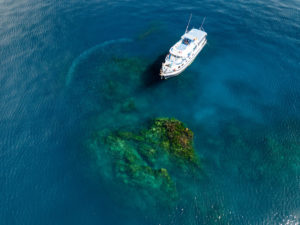
Liveaboard diving offers the perfect opportunity to head to Thailand in February. There you can enjoy the crown jewels of Thailand diving — the Similan Islands and Richelieu Rock — while searching for whale sharks and manta rays.
You can spot whale sharks at Richelieu Rock from late February, as well as large schools of barracuda, groupers and plenty of critters. This remote and biodiverse pinnacle is in the open ocean and it’s best this month, not only for the chance to see whale sharks, but also for calm seas and dry days.
The Similan Islands are equally as impressive, offering some of the best dive sites in Thailand. Dive here among thriving reefs, submerged boulders and rock formations. There are coral-encrusted ledges and swim-throughs to explore, plus the chance to see whale sharks, manta rays and turtles.
Finally, don’t miss a chance to dive the Surin Islands. Access these remote islands via Surin Islands liveaboards and the reward will be healthy reefs with huge numbers of turtles, both green and hawksbill. These islands are ideal for a quiet dive holiday away from the crowds.
An experienced diver will get the most of out the Similan Islands and Richelieu Rock. There are numerous liveaboards to choose from and many safaris combine the Similans with Richelieu.
The Bahamas
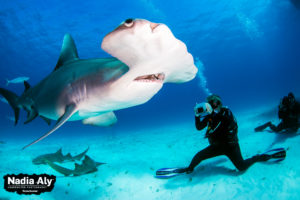
If you’re a fan of sharks, Bahamas diving is a must in February. There are plenty of hammerheads and tiger sharks about, plus lemon sharks, nurse sharks, inquisitive Caribbean reef sharks and maybe even bull sharks.
Tiger Beach is the place to go for tiger-shark diving, and February marks the end of the tiger-shark breeding season. The dives here are shallow, only 20 to 23 feet (6 to 7 m) and above white sands, resulting in perfect photographic opportunities and easy dives.
The Bimini Islands are famous for great hammerheads, present from January through March, and bull sharks. Hammerhead dives also take place on white sand in around 20 feet (6 m) of water. The Bahamas Master offers combined hammerhead and tiger-shark safaris at this time of year.
Turks and Caicos
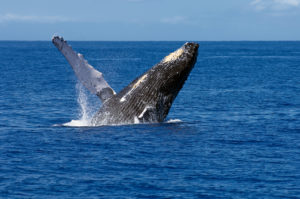
his archipelago of over 40 islands lies southeast of the Bahamas and is famous for its flourishing reefs, sheer coral walls and white-sand beaches. It is a great destination any time of year, but February offers something extra special: the arrival of humpback whales.
The dive sites around Providenciales offer plunging walls, while Grace Bay has deep canyons and West Caicos hosts numerous pelagics. There is plenty of marine life wherever you go, including Caribbean reef sharks and nurse sharks, turtles, bottlenose dolphins and eagle rays. Humpback whales are present from January to March each year as they migrate through the area.
Ari Atoll, the Maldives
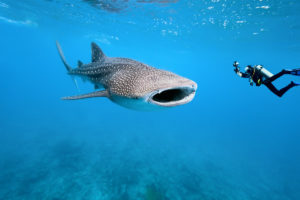
Ari Atoll in the Maldives offers a different experience from most dive areas in the country as it doesn’t feature long stretches of reef. Instead, it offers thrilling dives around underwater islands, lagoons and channels. February is a great month to make the most of long, dry days, calm seas, and to score the best chances of diving with mantas and whale sharks.
Almost all of the diving is drift diving and the currents can be strong, making Ari Atoll best suited to experienced divers. There are plenty of dive sites to choose from, including Mushi Mas Mingle Thia, one of the best dives in the Maldives. Here you can see groups of gray reef sharks, whitetip sharks, jacks, tuna and more. Maamigili Beru in the south of the atoll is ideal for whale-shark encounters as you drift past reefs and sandflats.
There are numerous Ari Atoll liveaboards to choose from, including budget and luxurious options.
The Poor Knights Islands, New Zealand
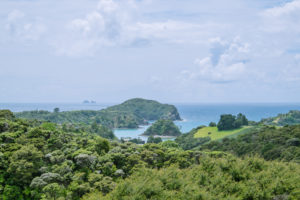
New Zealand might not be at the top of your diving wish list, but this adventure-travel destination offers great diving at the Poor Knights Islands, especially during the New Zealand summer.
The Poor Knights Islands lie 14 miles (23 km) off the Tutukaka coast and offer diverse diving and marine-life highlights. Multiple dive sites offer a range of drop-offs, walls, caves and tunnels, plus kelp forests to explore. The islands are also home to the world’s largest sea cave.
Visit in February and you’re likely to see numerous stingrays as they gather to mate in archways, seeking protection from New Zealand’s orcas. Tropical visitors, such as mantas, humpbacks and turtles, also arrive in the summer months.
Diving at these unique islands is suitable for all experience levels. There are a limited number of dive operators to choose from based at Tutukaka.
Divers and writers at LiveAboard.com contributed this article.

